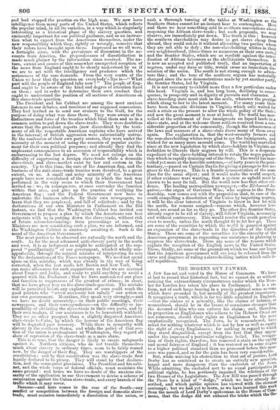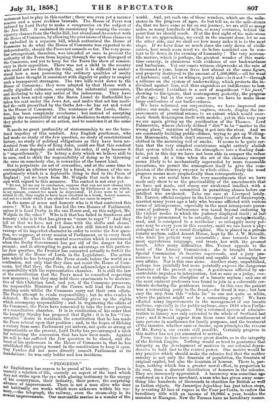THE MODERN GUY_FAWKES.
A JEW has sat and voted in the House of Commons. We have at last to record that historical fact, but we cannot do so without noticing the extraordinary circumstances under which the Mem- ber for London has taken his place in Parliament. It is a re- form, not of such large bearing in a purely political sense as some which have preceded it, but morally of the greatest importance. It recognizes a truth, which is far too little admitted in England, —that the claims of a minority, like the claims of infancy, or -womanhood, should be in the breast of conscience stronger than the demand of him who can enforce his claim ; and, therefore, in proportion as Englishmen who adhere to the Hebrew Creed are not numerous, should their rights as Englishmen be the more emphatically recognized. The Jews, be it remembered, have asked for nothing whatever which is not by law as well as equi.tY the right of every Englishman ; for nothing in regard to which they stand disqualified, except from the fact that they aPPear. under the impress of a particular religious belief. The recogni- tion of their rights, therefore, has removed a stain on the °PAY and moral fairness of England ; it has restored us in some degree to a higher political standard than we possessed before this mea- sure was passed, and so far the gain has been very considerable.. MBut, while waiving his obstruction to that act of justice, Derby has so contrived as to create an entirely new question, er and more dangerous than the exclusion of the J:evr.e• e admitting the excluded sect to an equal participation id political rights, he has perilously impaired. the relations of the Lord two Houses of the Legislature. The Jew Bill was passed throllib the Peers by a kind of "dodge," which we have already de- scribed, and which public opinion has viewed with the sternest contempt; but we had. yet to learn, as we have learned this week from the mouth of Lord Derby's spokesman in the House of Com- mons, that the dodge did not exhaust the tricks which the GO- verament had to play in this matter ; there was even yet a meaner reserve and a more reckless bravado. The House of Peers was in- awed by Lord Derby to make a compromise en the subject of the Jew Pill. It sustained its consistency by erasing the eman- cipatory clausesfram the Oaths Bill, but abandoned its contest with the House of Commons, by allowing the provisions of those clauses to be embodied in a separate bill, which authorized the House of Commons to do what the House of Commons was expected to do independently, should the Peers not concede so far. The very pecu- liar arrangement, therefore, was intended at once to prevent the authority of the Peers from lapsing through the open disregard of the C0111111011s, and yet to keep for the Peers the show of consist- ency in their opposition. There was not a child in the eountry who could not see through the trick, and it is difficult to under- stand how a man possessing the ordinary qualities of sanity ehould have thought it consistent with dignity or policy to employ such a transparent stratagem. The two bills went down to the Rouse of Commons ; they were adopted by that House with a really dignified calmness, accepting the substantial concession, and declining to take any notice of the indecorum. They have this week been acted upon ; the Baron Lionel de Rothschild has taken his seat under the Jews Act, and under that act has modi- fied the oath prescribed by the Oaths Act—he has sat and voted in the House of Commons. The resistance of the Lords, there- fore, has been completely overborne ; but instead of accepting frankly the responsibility of acting in obedience to state-necessity, they prefer to connive at an action, and to condemn it at the same time.
It needs no great profundity of statesmanship to see the bare- faoed impolicy of this conduct. Any English gentleman, who had made no study of the Jew question, no study of constitutional history, no study of political obligations as they have been un- derstood from the days of King John, could see that this conduct would at once degrade and enfeeble his order, if only because it is "ungentlemanly." To betray a duty which we believe still to be ours, and to shirk the responsibility of doing so by throwing the onus on somebody else, is cowardice of the basest kind.
But to perpetrate an act of cowardice, and at the same time to contemplate an ulterior victory by a fraud, is a climax of the un- gentlemanly which is a deplorable thing to find in the Peers of England ; yet we learn from Mr. Walpole that such is the de- sign with regard to this measure. The contest is not over yet. "Do not, let me say in conclusion, suppose that you are now closing this guestion. The course which has been taken by Parliament is one which, in my opinion, cannot too much be deprecated. If Sews were to be ad- mitted at all, they ought to have been admitted in a frank, honest manner, and not in a mode which I am afraid we shall see cause to regret."
In the name of sense and honesty who is it that contrived this course? Who is it that has led the two Houses of Parliament, unless it is Lord Derby in the one House and, on this subject, Mr. Walpole in the other ? Who is it that has failed in frankness and. honesty ; who is it that has given us "cause to reget" ? And they tell us that we have not yet done with the shifts and shams ! Those who assented to Lord Lucan's Act still intend. to take ad- vantage of its imperfect character in order to revive the Jew ques- tion, we suppose, at every session of Parliament, or in every fresh Parliament ? That is the mental reservation which is announced when the Derby Government has got rid of the danger for the present ; and in attempting to gain an advantage on this particu- lar Jew question, the Premier has consented actually to forfeit the position of the House of Lords in the Legislature. The action into which he has betrayed the Peers stands before the world as a confession, not only that they dare not resist the House of Com- mons, but that they, the Peers, do not acknowledge a coordinate responsibility with the representative chamber. It is still the law of the constitution that the Peers must be consulted respecting new measures ; but they may hold those enactments to be destruc- tive of this Christian land, and yet, if the Commons persevere, the responsible Ministers of the Crown will lead. the Peers in standing aside whilst the Commons carry out their own edicts. The Peers attempt to evade responsibility ; but he who evades is defeated. He who disclaims responsibility gives up the rights which accompany responsibility ; and in registering the edicts of the Commons, the Peers have consented to take the lower position of a consultative chamber. It is in vindication of his order that the haughty Stanley has proposed that flight ; it is in his " Con- servative " desire to maintain the constitution that he has made the Peers retreat upon that position ; and, in the hopes of filching a victory from some Parliament yet unborn, not quite so strong or impracticable as the present, Lord Derby has prearranged a trick for retracting the concession that has now been made. Against his will he has suffered the Jew question to be closed, and the boast of his spokesman in the House of Commons is that he has established this gaping wound in the constitution to keep it open. Guy Fawkes did not more directly assault Parliament at its foundations : he was only bolder and less insidious.



























 Previous page
Previous page